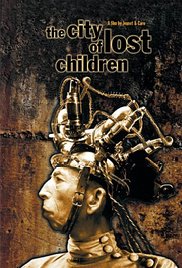
CITY OF LOST CHILDREN/ CITE DES ENFANTS PERDUS
France, 1996, 112 minutes, Colour.
Ron Perlman, Daniel Emilfork, Judith Vittet, Dominique Pinon, Jean- Claude Dreyfus, Genevieve Brunet, Odile Mallet, Mireille Mosse, Rufus, Joseph Lucien.
Directed by Marc Caro, Jean- Pierre Jeunet.
A challenge! Some years ago, French writer-director team, Jeunet and Caro, made a surreal, futuristic satire on an apartment block and food shortage, Delicatessen. This is a much more ambitious and complex second film. First of all, it is a visually stunning film in design, decor, lighting and camera techniques. But the plot? Best to indicate that it opens with a striking Santa Claus dream... and the film is full of dreams. But they are shown in the context of mad scientists doing research on children - especially a character called Krank who wants to steal children’s dreams to save him from becoming older. He is subservient to his father who remains isolated brain in the tank. He has seven children, all played by Dominique Pinon, who all suffer from narcolepsy.
There is a little boy who dreams, his brother who is a strong man in a circus, a young girl from the orphanage, an adventure where the brother and the little girl go on request to find the little boy.
Children are victims of cruel Siamese twin teachers and there are further villains and strange heroes. One wonders whether Jeunet and Caro were making it up as they went along. But, that's probably all right with dreams. There are many thought-provoking themes concerning science, experiments, violence and children.
There is the original French version and an English-dubbed version with some of the cast, including Ron Perlman and Judith Vittet dubbing their characters.
But I think I had better see it again. Wonderful weirdness.
1. The impact of the film? Weird and bizarre? Surreal? A visual work of art? Sound and music?
2. The work of the directors, their films, set design?
3. The surreal locations, the port, the oil rig, the boats, homes, laboratories, interiors, the exteriors, studio stage sets? The musical score? Marianne Faithfull and the final song?
4. The film seen as a fairytale, a weird fairytale, variations on the theme, especially children dreaming, the stealing of their dreams, their nightmares? The city, the children, lost, searching?
5. The cast, their appearances, a selection of grotesques?
6. The child, the dream about Santa Claus, the many Santa Clauses appearing, his fear? The little boy, capture, lost, the search of him? His older brother?
7. Krank, his appearance, the touch of the grotesque and the intimations of the vampire? His being cursed? His quest, not wanting to grow old, the children, harvesting their dreams, discovering they were nightmares? The presence and action of his wife? Midget? His father, the isolated brain, in the water tank, consulting the brain, his voice, his advice? The seven sons, the similarities of appearances, the same actor portraying them all, the differences, the brother wanting to claim being the original, the reaction of the others? Their activities? Unable to sleep? Their influence on the search? On the boat, on the week rig? Interventions and rescues?
8. The strong man, his role in the circus, the circus master? His going, his brother, the trek and the quest, the different encounters, the little girl, the relationship, dependence, innocent? Her being also worldly-wise, the participation in the search, the effect on her?
9. The sisters, Siamese twins, played by two different actresses, echoes of wicked witches, the control of the children, the discipline, their commands, the reactions against them?
10. The focus on to the strong man, the One, his physical strength, his mental limitations, dependence on the little girl, the series of adventures?
11. The little boy, lost, dreams, with the other orphans, their uprising?
12. The overall impact of this story, the invitation to people to follow it, understand it, enter into it, and use their imaginations as they
would interpret the experience of dreams?